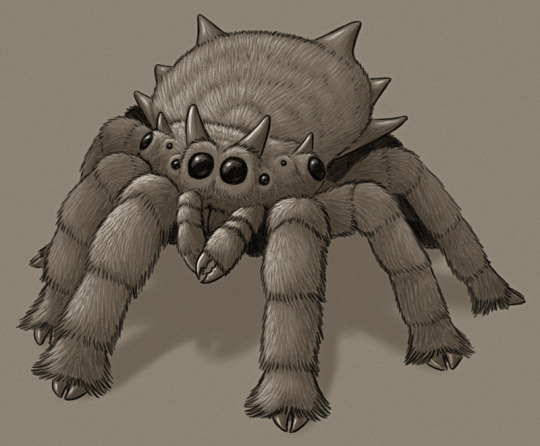#have a little hint of carcinization. as a treat
Explore tagged Tumblr posts
Text
Spectember/Spectober 2023 #11: A Large Spider
An anonymous submission requested a "spider the size of a coconut crab":

Ceratohispidus aspectus is a distant descendant of jumping spiders living on an Aotearoa-like landmass, isolated with no mammalian predators.
This particular lineage is notable for both their extreme gigantism (with their larger size and weight causing them to lose the ability to jump) and for having taken up herbivory in a similar manner to one modern species. Most of these big plant-eating spiders are around the size of wētāpunga, and occupy a similar ecological niche, but Ceratohispidus is the largest of them by far – rivalling the modern coconut crab with a body length of up to 40cm (~1'4") and a legspan of almost 1m (~3'3").
After reaching sexual maturity at 5-10 years old, adults grow very slowly, molting only once every year or two and taking several decades to actually get anywhere close to their maximum size.
Ceratohispidus' thick legs end in hoof-like claws, and it selectively browses on vegetation by snipping off pieces with its pincer-like palps. A gizzard-like structure in its digestive system helps to grind up fibrous plant material with small gastroliths, and its wide abdomen houses both large book lungs and a tracheal system with air sacs that can contract and expand to provide a small amount of active ventilation.
While the "horns" and spikes ornamenting its body may provide some defense from the few avian and reptilian predators in its habitat, they're mainly used as part of highly elaborate visual displays between individuals.
#spectember#spectober#spectember 2023#speculative evolution#arachnophobia tw#jumping spider#spider#arachnid#arthropod#invertebrate#art#science illustration#happy halloween#have a little hint of carcinization. as a treat
369 notes
·
View notes
Text
#have a little hint of carcinization. as a treat
Spectember/Spectober 2023 #11: A Large Spider
An anonymous submission requested a "spider the size of a coconut crab":

Ceratohispidus aspectus is a distant descendant of jumping spiders living on an Aotearoa-like landmass, isolated with no mammalian predators.
This particular lineage is notable for both their extreme gigantism (with their larger size and weight causing them to lose the ability to jump) and for having taken up herbivory in a similar manner to one modern species. Most of these big plant-eating spiders are around the size of wētāpunga, and occupy a similar ecological niche, but Ceratohispidus is the largest of them by far – rivalling the modern coconut crab with a body length of up to 40cm (~1'4") and a legspan of almost 1m (~3'3").
After reaching sexual maturity at 5-10 years old, adults grow very slowly, molting only once every year or two and taking several decades to actually get anywhere close to their maximum size.
Ceratohispidus' thick legs end in hoof-like claws, and it selectively browses on vegetation by snipping off pieces with its pincer-like palps. A gizzard-like structure in its digestive system helps to grind up fibrous plant material with small gastroliths, and its wide abdomen houses both large book lungs and a tracheal system with air sacs that can contract and expand to provide a small amount of active ventilation.
While the "horns" and spikes ornamenting its body may provide some defense from the few avian and reptilian predators in its habitat, they're mainly used as part of highly elaborate visual displays between individuals.
369 notes
·
View notes